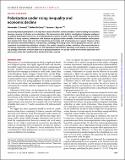Files in this item
Polarization under rising inequality and economic decline
Item metadata
| dc.contributor.author | Stewart, Alexander J | |
| dc.contributor.author | McCarty, Nolan | |
| dc.contributor.author | Bryson, Joanna J | |
| dc.date.accessioned | 2021-02-10T17:30:11Z | |
| dc.date.available | 2021-02-10T17:30:11Z | |
| dc.date.issued | 2020-12-11 | |
| dc.identifier | 272142670 | |
| dc.identifier | b57e0220-03d3-401f-9c4e-92547edaece7 | |
| dc.identifier | 33310855 | |
| dc.identifier | 85097962584 | |
| dc.identifier.citation | Stewart , A J , McCarty , N & Bryson , J J 2020 , ' Polarization under rising inequality and economic decline ' , Science Advances , vol. 6 , no. 50 , eabd4201 . https://doi.org/10.1126/sciadv.abd4201 | en |
| dc.identifier.issn | 2375-2548 | |
| dc.identifier.other | PubMedCentral: PMC7732181 | |
| dc.identifier.other | ORCID: /0000-0001-5234-3871/work/86538500 | |
| dc.identifier.uri | https://hdl.handle.net/10023/21404 | |
| dc.description | Funding: The authors acknowledge funding from the Defense Advanced Research Projects Agency NGS2 program (grant D17AC00005 to A.J.S.) and the AXA Research Fellowship Award (to J.J.B). | en |
| dc.description.abstract | Social and political polarization is an important source of conflict in many societies. Understanding its causes has become a priority of scholars across disciplines. We demonstrate that shifts in socialization strategies analogous to political polarization can arise as a locally beneficial response to both rising wealth inequality and economic decline. In many contexts, interaction with diverse out-groups confers benefits from innovation and exploration greater than those that arise from interacting exclusively with a homogeneous in-group. However, when the economic environment favors risk aversion, a strategy of seeking lower-risk in-group interactions can be important to maintaining individual solvency. Our model shows that under conditions of economic decline or increasing inequality, some members of the population benefit from adopting a risk-averse, in-group favoring strategy. Moreover, we show that such in-group polarization can spread rapidly to the whole population and persist even when the conditions that produced it have reversed. | |
| dc.format.extent | 9 | |
| dc.format.extent | 603802 | |
| dc.language.iso | eng | |
| dc.relation.ispartof | Science Advances | en |
| dc.subject | HV Social pathology. Social and public welfare | en |
| dc.subject | QA Mathematics | en |
| dc.subject | DAS | en |
| dc.subject | SDG 10 - Reduced Inequalities | en |
| dc.subject.lcc | HV | en |
| dc.subject.lcc | QA | en |
| dc.title | Polarization under rising inequality and economic decline | en |
| dc.type | Journal article | en |
| dc.contributor.institution | University of St Andrews. Applied Mathematics | en |
| dc.identifier.doi | https://doi.org/10.1126/sciadv.abd4201 | |
| dc.description.status | Peer reviewed | en |
This item appears in the following Collection(s)
Items in the St Andrews Research Repository are protected by copyright, with all rights reserved, unless otherwise indicated.

